Egwu Nkwa Ndi Igbo: Igbo Music And Musical Instruments

Igbo music (Igbo: Egwu nkwa ndi Igbo) is the music of the Igbo people, who are indigenous of the southeast region of Nigeria. Most of Igbo music is lively, energetic, and spontaneous, which produces a wide range of sounds that allow the Igbo people to incorporate music into practically every aspect of their everyday lives. The Igbo music genres of Igbo highlife, Igbo bongo, Odumodu, Ekpili, Ogene, Igbo gospel, and Ikorodo are some of the most well-known.
Musical instruments are instrument created or adapted to make musical sounds. In Igbo culture, musical instruments are employed for more than just generating music; they also serve as a medium for translating and emitting daily experiences and happenings to both man and spirit. These musical instruments are used primarily by masquerade, dance, and musical groups in special human activities like; rituals, spiritual and cultural events as well as births of new born and funerals. Today, they are also used to accompany church choirs.
Igbo Sound/Musical Instruments:
1. Oja (Flute):

The sound produced from this flute is not just a random sound played but an esoteric art, making Oja the soul of Igbo music. It's a carved piece of wood that is designed to play by using fingers and lips. The artist blows air through the carved holes and manipulates the sound of the music. They control the rhythm of the music with the two smallest holes on the top and leave the bottom hole alone to create sounds. It is known as the only instrument that speaks to gods, calms down an angry spirit, gives courage and strength to the weak. In some parts of Igbo land, Oja is believed to choose and speak to its master (ogbuoja).
2. Udu (Pottery drum):
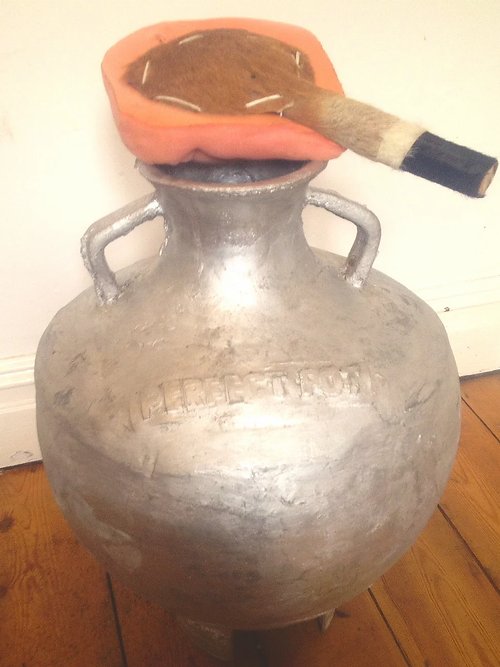
The Udu (Pottery-drum) is a clay spherical with an interior hollow and a little round open mouth. Udu's main purpose is to create musical bass. The performers can achieve it by tapping the open mouth of the drum with a round and flat foam-leather object, shaped like a hand-fan. Keep in mind that the instrument is very delicate. Traditionally, women played this instrument, which is used for traditional rites of passage, weddings, and community gatherings.
3. Igba (Talking/Cylinder Drum):
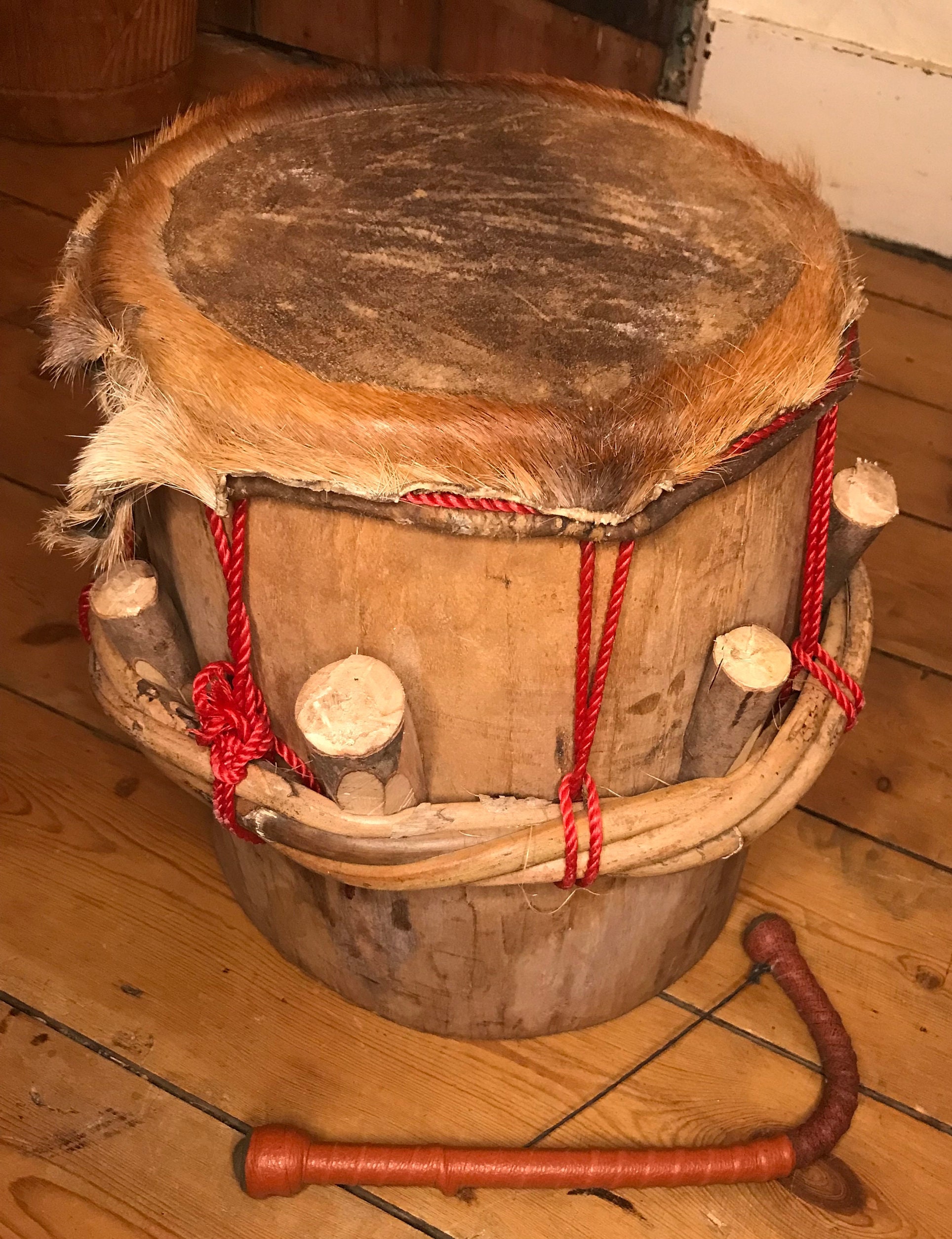
The Igba is a piece of solid wood together with an animal skin covering (from antelope) fastened tightly to one end. Through the use of a shoulder strap, the artist carries it over his shoulder. By striking the animal skin with his fingers, or a combination of one set of fingers and a particular stick, the artist creates the sound. The cylinder-drum is used to accompany dances, songs, religious rituals, and secular festivities. Its music has been used to announce both good and terrible news in the past. Igba has various names based on its size. The variety of this instrument has led to the development of numerous drum types over time.
4. Ogidi (Long Igba):

The Ogidi is a piece of hollow wood covered at one end with animal hide held down tight with fasteners. The artist carries it over his shoulder with the help of a shoulder strap. Ogidi which is also known as Nne Igba, Igba Ogidi, Igba Eze/Igba ndi Eze is the longest Igba.
5. Alo/Ugbom (Long Metal Gong):

This is a long, hollow gong made of metal. Alo is a struck idiophone instrument that makes a loud, sharp sound, just like the Ogene. In Igbo music, the Alo, a huge metal bell gong, has great significance.
6. Ogene (Metal Gong):

In Igboland, the Ogene, a bell-like instrument resembling a gong, is frequently employed as the "master instrument" in a bell orchestra. It is an instrument of the struck idiophone class produced locally by skilled blacksmiths out of iron. The bell is hollow within and has a conical-like flattish shape. Ogene is available in a variety of sizes, including single, double (ogene mkpi abuo), and triple (ogene mkpi ato).
Despite being a traditional music, Ogene has made its way into the contemporary Afrobeats genre. Additionally, it is particularly helpful in helping dancers time their gestures and movements. The iron body vibrates when struck with a wooden striker, which produces the sound.
7. Ekwe (Slit-drum):
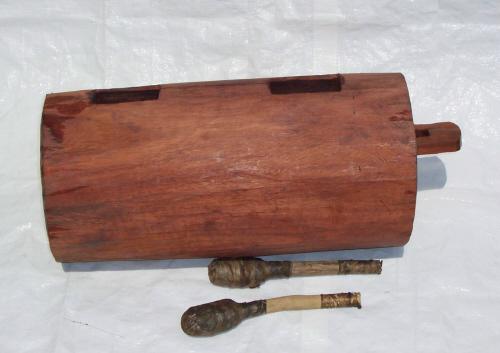
The Ekwe is an Igbo traditional musical instrument used by the Africans to create music at festive or celebrations. It is made from wood and it’s hollow. Igbo people play the Ekwe, a two-pitch log drum. Yellow or red hardwoods are the two types available. It is either played with a simple, straight wooden stick or a short beater with a rubber tip that resembles a huge balafon or an Alo (long gong-bell) mallet. Greater Ekwes are typically played with two sticks, whereas smaller ones are typically played with just one stick.
The Ube wood that is used to carve Yellow Ekwe log drums is also referred to as "white wood," but not because the drum's exterior is naturally yellow; rather, the drum's shell is painted with a yellow powder that has been diluted in water before being applied to the drum. The naturally red wood used to carve the Red Ekwe is referred to as "Orji" in Igbo. Because of its gorgeous vivid red colour and resistance to insect (termite/worm) damage, this wood is more expensive than the "white" wood used in the Yellow Ekwe.
8. Ichaka (Calabash Rattle):
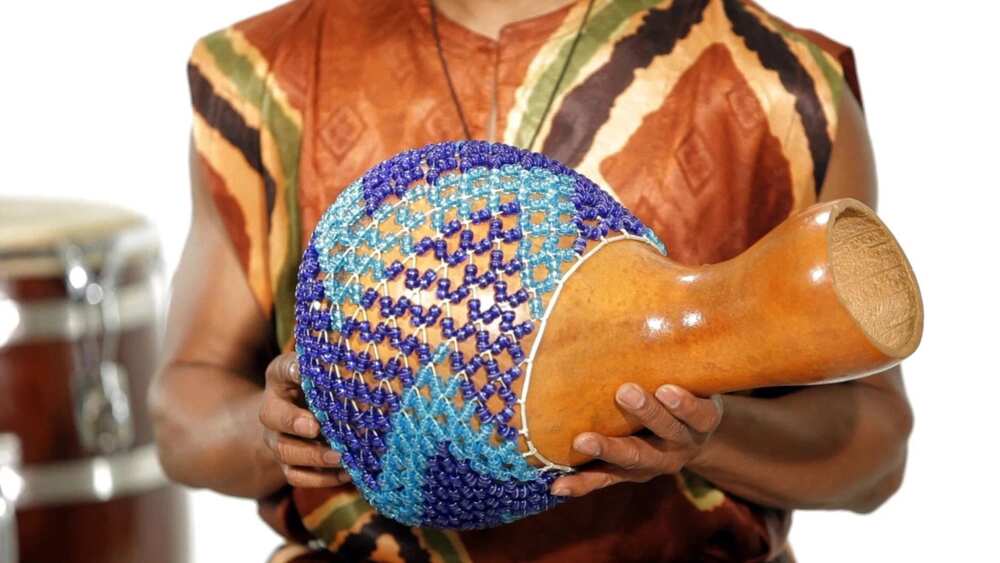
Ichaka is one of the most basic Igbo musical instruments, but its sound can still take you by surprise. It makes a rattling sound when you shake or tap the Ichaka. It frequently serves as a complement to other musical instruments. Typically, two varieties of ichaka are produced. Ichaka and Ube of the calabash.
9. Opi (Horn):

The Opi is constructed from elephant tusk or animal horn. It has a hole at the edge where air may be pushed through to create sound. The horn signals the entrance or exit of the Igwe, the Oba, or a large masquerade.
10. Nyo/Osha:

Nyo is a percussion instrument consisting of a closed basket with a flat bottom filled with seeds or other small particles. The round bottom is traditionally cut from a dried gourd. Nyo is an indirectly struck idiophone. In Igbo Land the Nyo is played alongside other musical instruments.
11. Ikoro:
Ikoro, The most cherished and esteemed musical instrument in Igbo Land. Everything comes to a complete stop when the Ikoro calls. The Ikoro is a sizable slit drum that is used in Igbo land for communication. Ikoro brings a sense of urgency to Igbo land and cannot be defeated by anyone. It is crucial that everyone congregates in the village square whenever the Ikoro sound is heard. People in the area instantly assume that one of the following has occurred: the land has been defiled, war has broken out, a calamity has befallen the community, etc. Everyone must congregate in the village square to hear the most recent news whenever the Ikoro call is heard. The size is the only distinction between Ikoro and Ekwe. Ekwe is portable and compact in comparison to Ikoro, which cannot be carried by one person and is never moved from one area to another. Ikoro is kept in a set location, typically in the village square.
12. Nkonko/Nkpokoro:

The Nkonko/Nkpokoro, also known as Ekwe nta or Ekwe Aka or Okwa, is a very small Ekwe that can be played with just one hand. It is an Igbo musical instrument made of wood.
Okike, Ọdu-mkpalọ and Enenke (Trumpets):
Okike, Ọdu-mkpalọ and Enenke are all trumpets or horns made from the bones or horns of wild animals. In accordance with the standards and values associated with the animals from which it is derived, each horn is treated with respect and given its proper purpose. The social obligations of society are also influenced by these animal-based standards and ideals.
Therefore, the Igbo people make use of these musical instruments to achieve their goals in social responsibilities such title taking (Ichi Ọzọ), marriages, funeral rites, and emergencies. Modern Igbo society is still impacted by and values these musical instruments despite modernity and Christianity.
13. Okike:

Ọdu-okike or okike is the most famous, sophisticated and rare Igbo musical instrument is the okike. The Okike is mostly used by an Ọzo or Nze and is made from an elephant's tusk. Only in situations denoting riches and power is okike utilised. It is used during installations into Ọzọ or Nze titleships, Ofala and major festivals. Additionally, it is utilised during the performance of titled individuals' funeral rites as well as during the customary Igbo the elite wedding ceremonies. It can be blown both individually and collectively. Okike's distinctive tone connotes celebration and social development. When an Igwe of a town performs the Ọfala, kings' festivals in Igbo land, the Igba-eze dance is usually accompanied by the blowing of okike.
14. Ọdu-mkpalọ:
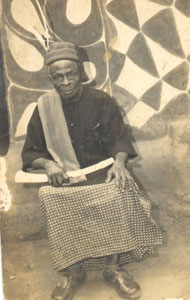
Ọdu-mkpala-alọ is a short form of okike which must be held by the Igbo Ọzọ titled man. Unlike the okike which is heavy and long, odu-mkpa-alọ is held constantly on any occasion, be it marriage, death or a town gathering. It is associated with the red cap and eagle feathers for the ọzọ man and must be exhibited always for social recognition. Most of the time the holders are not experts in blowing it, but they need to hold it as occasion warrants.
15. Enenke:
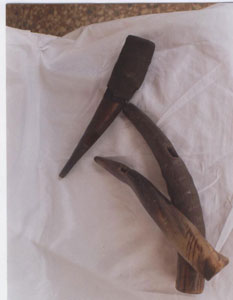
Enenke is a horn made from the wild animal known as ene (deer), unlike the okike and ọdu mkpalo-alo. It serves a very distinct purpose than the other two. Nobody owns an enenke, and it is not a status symbol per se; rather, it is a tool used by specialised artists whose job it is to perform when required.
It is a warning sign for danger or death when heard around midnight. Late evenings may be for the heralding of mortuary rites. In the mornings, it may be for festivals, marriage attendance or a call for emergency meetings at the village square. In burials, great men and heroes go home to the sound of enenke. Also, in bringing home the symbolic corpse of a deceased Nwada (daughter of the community), the ceremony is heralded with the sound of enenke, songs and dances.
Other types of horn-trumpets like Ntutu or Ogbo from mkpi-atu, buffalo, or bush goats, and even the horn of rams which are used for committal music may be classified under Enenke.
16. Ekpiri:


Ekpiri is a type of percussion instrument used by the Igbo which produces a sound when shaken. Ekpiri is mostly used my masquerade groups and its in two types. While one is held in the hand, the other is worn in the ankle.
17. Ubo (thumb piano):

The ubo-aka is a “thumb piano” of the Igbo people. Ubo is an Igbo musical instrument like that of a string guitar with Several cane stalks bound together. The strings are made by raising the hard part of the canes on both sides. The front strings are played while the back strings act as resonators. Ubo, just like Ubo Akwara is rarely used these days.
18. Mgbirimgba:

Mgbirimgba is a musical instrument worn in the ankle, it sounds comes from the movement of the body while the dance is going on.
 Igbo Language & Culture
Igbo Language & Culture